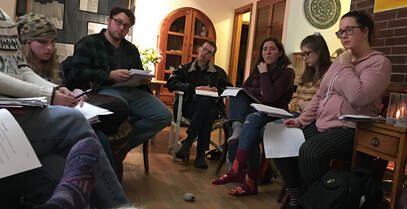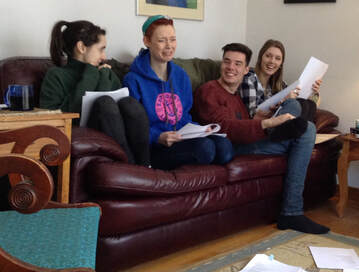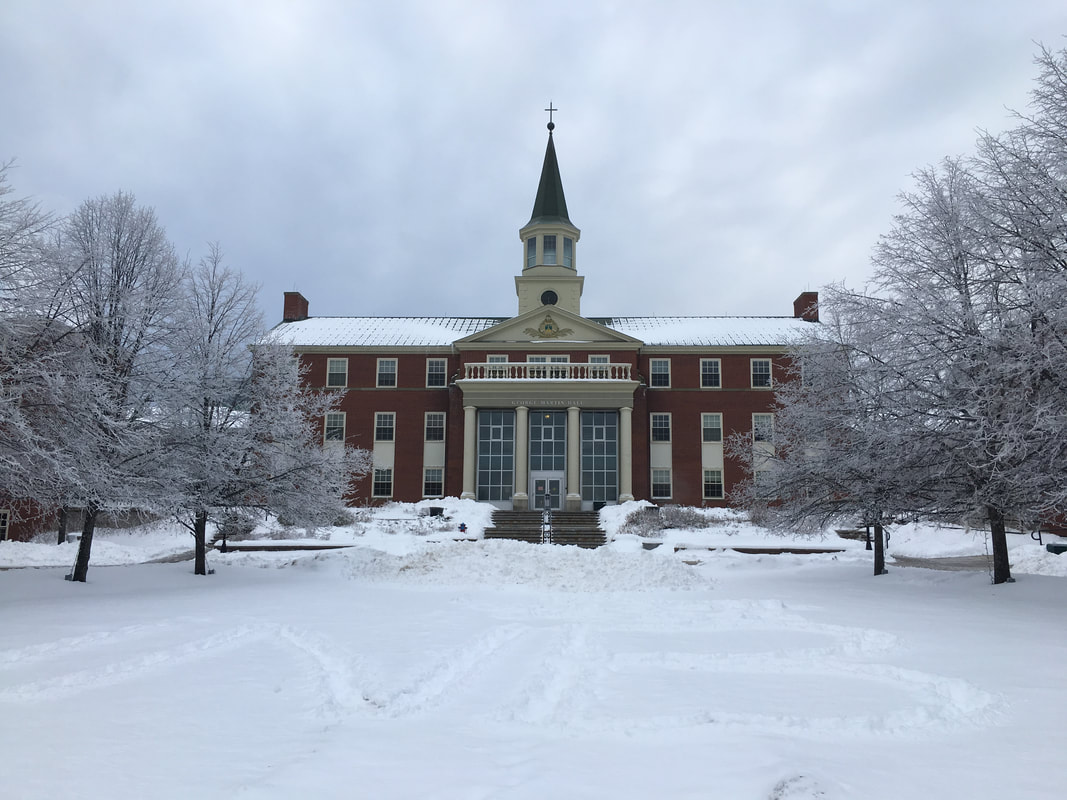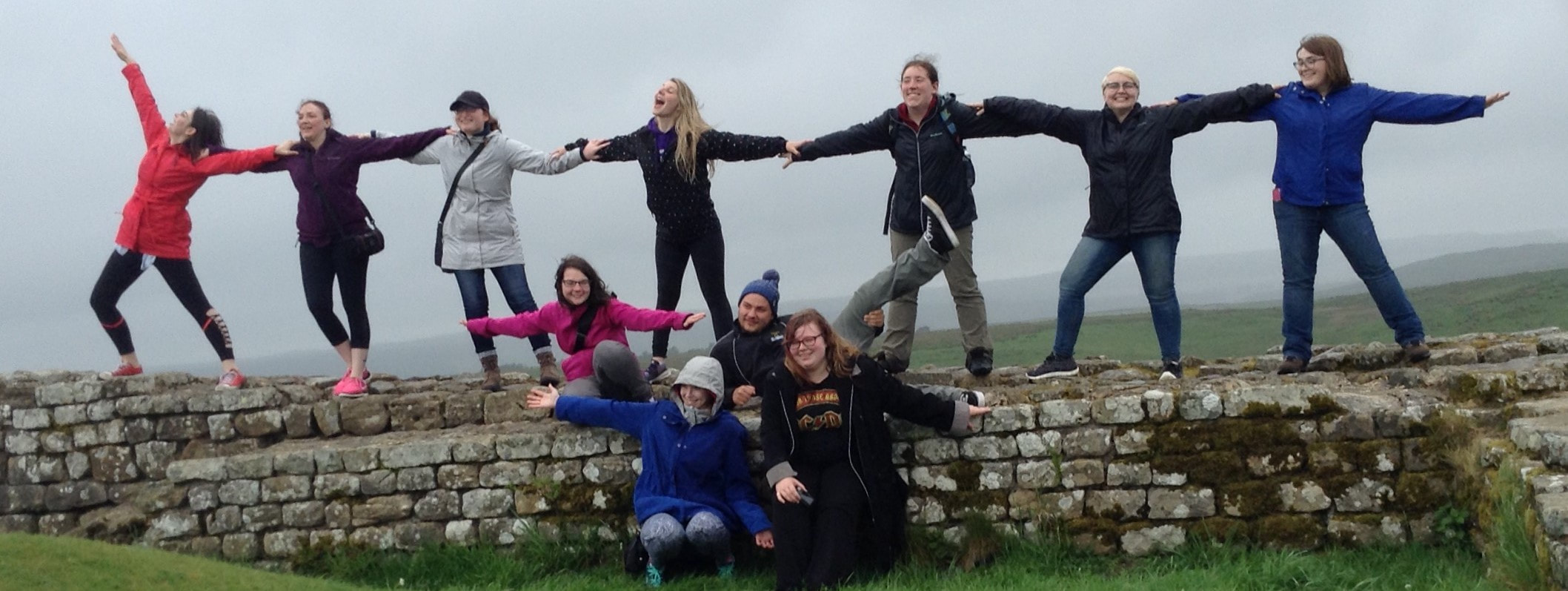|
Since 2002, Kathy Mac has taught in the Department of English Language and Literature at St. Thomas University, a small Liberal Arts institution in Fredericton, NB, Canada. In 2011, she took on the job of Creative Writing Advisor, which involved first developing, and now administering the Concentration in Creative Writing for Majors and Honours students. Prior to 2011, STU had only two courses in creative writing; now there are five offered annually, out of a suite of nine.
|
Creative Writing Courses

The workshop provides the beating heart of most Creative Writing classes. When introduced as a compassionate, constructive activity, workshopping develops students’ skills both through critiquing others’ assignments, and hearing their own work critiqued by their peers.
2113: Creative Writing Skills.
I can’t teach inspiration. I can teach the craft of writing: techniques to develop, how to evaluate writing, how to take criticism constructively, how to stand up in front of people and read, etc. We’ll talk about this in class, and then you will apply the ideas in your weekly assignments The course is organized into four modules by genre: prose, script, poetry, and revision.
2123: Creative Writing Strategies.
Creative Writing Strategies will get you thinking like a writer (not a reader), like a producer (not a consumer) of stories. The prof, guest writers, and your creative work will explore issues central to writers today: competitions and prizes, booksellers, copyright law, agents, publishing (traditional and indie), writing groups, resources (on-line, in person, and of course in books), 2LGBTQIA representation, colour bars in characters, etc.
3103: Advanced Poetry Workshop.
In this course we will explore many creative possibilities of poetry. Three modules -- Inside to Out, Local to Global, and Now to Then – introduce students to common and uncommon subjects, forms and literary devices.
Each module begins with an adventure class, followed by workshop classes during which we will work on that week’s assignment. However, the prof will also bring in a poem by an established writer every week. Students may chose to write a poem in response to that instead of the assignment.
3113: Advanced Prose Workshop.
Take this course if you have story-telling in your blood. Literature courses teach narrative objectively, assuming that students are readers – in this course you will do narrative, and also look at some ways successful writers do it.
We will explore aspects of writing prose fiction and/or creative nonfiction largely by writing both out-of-class and in-class – as well as the essential workshop work of reading and commenting on each others' writing.
3133: Special Topics in Creative Writing: Visual Texts.
Texts and images combine in multiple ways, from “high” art, to art books and zines, to memes, to graphic novels, to ekphrastic writing (writing inspired by visual art), etc.. This course will enrich your visual literacies, by bringing together two disciplines historically separated in academe, even though they are constantly joined in culture. The three hour time-slot allows us to include experiential “adventure” classes, at least one of which will be held in the Beaverbrook Art Gallery. It will also include essays or book chapters as required reading. Class time will be taken up with lecture, studio work, and workshopping -- responding to each other’s assignments.
3153: Literary Publishing
This course provides students with an understanding of the current, evolving state of literary publishing in Canada – traditional and indie. Topics can range from proposal and manuscript submission to the production, marketing, and distribution of print and electronic books. It also considers the role of publishing within wider literary cultures.
4153: Senior Project in Creative Writing
The Senior Project is your opportunity to work on an extended project of your choice, as author, translator, chief editor, etc. This is your passion project. Beginning with a proposal which includes (a) a description of the project; (b) a sample excerpt; and (c) a bibliography of similar works and resource material, students will create or compile an extended project. The length of each project will vary according to genre.
2113: Creative Writing Skills.
I can’t teach inspiration. I can teach the craft of writing: techniques to develop, how to evaluate writing, how to take criticism constructively, how to stand up in front of people and read, etc. We’ll talk about this in class, and then you will apply the ideas in your weekly assignments The course is organized into four modules by genre: prose, script, poetry, and revision.
2123: Creative Writing Strategies.
Creative Writing Strategies will get you thinking like a writer (not a reader), like a producer (not a consumer) of stories. The prof, guest writers, and your creative work will explore issues central to writers today: competitions and prizes, booksellers, copyright law, agents, publishing (traditional and indie), writing groups, resources (on-line, in person, and of course in books), 2LGBTQIA representation, colour bars in characters, etc.
3103: Advanced Poetry Workshop.
In this course we will explore many creative possibilities of poetry. Three modules -- Inside to Out, Local to Global, and Now to Then – introduce students to common and uncommon subjects, forms and literary devices.
Each module begins with an adventure class, followed by workshop classes during which we will work on that week’s assignment. However, the prof will also bring in a poem by an established writer every week. Students may chose to write a poem in response to that instead of the assignment.
3113: Advanced Prose Workshop.
Take this course if you have story-telling in your blood. Literature courses teach narrative objectively, assuming that students are readers – in this course you will do narrative, and also look at some ways successful writers do it.
We will explore aspects of writing prose fiction and/or creative nonfiction largely by writing both out-of-class and in-class – as well as the essential workshop work of reading and commenting on each others' writing.
3133: Special Topics in Creative Writing: Visual Texts.
Texts and images combine in multiple ways, from “high” art, to art books and zines, to memes, to graphic novels, to ekphrastic writing (writing inspired by visual art), etc.. This course will enrich your visual literacies, by bringing together two disciplines historically separated in academe, even though they are constantly joined in culture. The three hour time-slot allows us to include experiential “adventure” classes, at least one of which will be held in the Beaverbrook Art Gallery. It will also include essays or book chapters as required reading. Class time will be taken up with lecture, studio work, and workshopping -- responding to each other’s assignments.
3153: Literary Publishing
This course provides students with an understanding of the current, evolving state of literary publishing in Canada – traditional and indie. Topics can range from proposal and manuscript submission to the production, marketing, and distribution of print and electronic books. It also considers the role of publishing within wider literary cultures.
4153: Senior Project in Creative Writing
The Senior Project is your opportunity to work on an extended project of your choice, as author, translator, chief editor, etc. This is your passion project. Beginning with a proposal which includes (a) a description of the project; (b) a sample excerpt; and (c) a bibliography of similar works and resource material, students will create or compile an extended project. The length of each project will vary according to genre.
Other Courses Kathy Mac Has Taught Recently
for St. Thomas University’s English Department

1016: English Literatures in History and Culture
1093: Reading and Responding to Indigenous Literatures
2103: Research Methods in English Literature
3403: Canadian Poetry
4426: Atlantic Canadian Poets
4816: The Popular Gothic
1093: Reading and Responding to Indigenous Literatures
2103: Research Methods in English Literature
3403: Canadian Poetry
4426: Atlantic Canadian Poets
4816: The Popular Gothic


